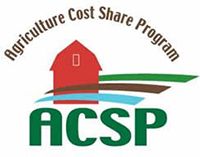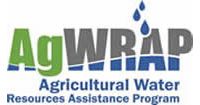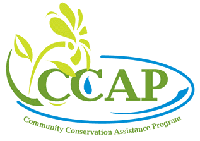Agricultural Cost Share Program (ACSP)

The major cause of water quality problems in North Carolina and in much of the United States is nonpoint source pollution. In many places, damage to our water resources comes from soil erosion, excessive fertilizer use, animal waste contamination, and improper use of agricultural chemicals.
The North Carolina Agriculture Cost Share Program helps address nonpoint pollution by providing technical and financial resources. This program helps landowners or renters of existing agricultural operations improve their on-farm management by using Best Management Practices, also called BMPs.
Who is eligible?
If you are a landowner or renter of an existing agricultural operation that has been operating for more than three years, you are eligible to participate in the North Carolina Agriculture Cost Share Program.
Your district works with agricultural landowners and renters to:
- Develop and approve individual conservation plans
- Identify the best management practices (BMPs) best suited for your particular operation
- Design BMPs and help ensure their longevity
- Acquire preliminary approval of a Cost Share contract
The division provides administrative and technical assistance to districts and gives final approval to cost share contracts, as well as processes requests for payments to farmers participating in the program.
How does the program work?
Submit an application to your local soil and water conservation district.
The applications are ranked based on resource concerns identified in the county. Applicants can be reimbursed up to 75% of a predetermined average cost for each BMP installed. The applicant is responsible for 25% of the costs. This may include the use of existing material and labor.
There are some cost share and acreage restrictions depending on the BMPs used, the type of operation involved, or policy set by the local soil and water conservation district or the N.C. Soil and Water Conservation Commission.
Cost share incentive payments are also available to encourage the use of certain agronomic management practices.
Agricultural Water Resources Assistance Program

The Agricultural Water Resources Assistance Program (AgWRAP) was authorized through Session Law 2011-145. The program is administered by the NC Soil and Water Conservation Commission through local soil and water conservation districts.
Who is eligible?
If you are a landowner or renter of an existing agricultural operation that has been operating for more than one year, you are eligible to participate. Cooperator must make less than $250,000 or have 75% or more of their income supported through agricultural operations.
The purposes of the AgWRAP are to:
- Identify opportunities to increase water use efficiency, availability and storage
- Implement best management practices (BMPs) to conserve and protect water resources
- Increase water use efficiency
- Increase water storage and availability for agricultural purposes
How does the program work?
The Soil and Water Conservation Commission allocates available AgWRAP funding into district allocations and the Regional Application Process. This split funding allows districts to implement locally led conservation projects through the available
best management practices (BMPs) in the program.
Applicants can be reimbursed up to 75% of a predetermined average cost or actual cost up to a cost cap for each BMP installed. The applicant is responsible for 25% of the costs. This may include the use of existing material and labor.
Community Conservation Assistance Program (CCAP)

The Community Conservation Assistance Program (CCAP) is a voluntary, incentive-based program designed to improve water quality through the installation of various best management practices (BMPs) on urban, suburban and rural lands not directly involved with agriculture production.
Who is eligible?
Eligible landowners may include homeowners, businesses, schools, parks and publicly owned lands.
Rapid urbanization affects water quality as North Carolina's land use continues to change.
CCAP can help educate landowners on water quality, stormwater management and retrofit practices to treat stormwater runoff.
How does the program work?
Interested landowners may apply to their local soil and water conservation district for financial and technical assistance for the installation of BMPs to protect water quality.
Applications are ranked based on local water quality priorities and, if eligible, a conservation plan is prepared. Landowners may receive financial assistance of up to 75 percent of the pre-established average cost of the BMP.
